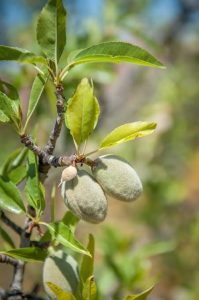BOTANICAL NAME: Prunus amygdalus
FAMILY: Roseaceae
ENGLISH NAME: Almond
COMMON NAME:
Hindi: badaam
Kannada: badam

REFERENCE: BHAVAPRAKASH SAMHITA with link e Nighantu:
https://niimh.nic.in/ebooks/e-Nighantu/bhavaprakashanighantu/?mod=read
वातादो वातवैरी स्यान्नेत्रोपमफलस्तथा |
वातादः उष्णः सुस्निग्धो वातघ्नः शुक्रकृद् गुरुः |
वातादमज्जा मधुरो वृष्यः पित्तानिलापहः |
स्निग्धोष्णः कफकृन्नेष्टो रक्तपित्तविकारिणाम् ||१०३||
HABITAT: Kashmir, Himachal
BOTANICAL DESCRIPTION:
Almond tree is a small, naturally found and also cultivated tree in the region of Kashmir, Himachal Pradesh and temperate regions of India. It grows up to a height of 6-8m bearing red flowers.
AYURVEDIC CHARACTERISTICS:
| RASA | GUNA | VEERYA | VIPAKA | PRABHAVA | DOSHGHNTA |
| Madhura | Snigdha
Guru |
Ushna | Madhura | Balya
Vrishya |
Vatahara
Pittkara |
AYURVEDIC ENERGETICS:
| TASTE | PROPERTY | POTENCY | POST DIGESTIVE EFFECT | EFFECT ACTION | DOSHA ACTION |
| Sweet | Oily, heavy | heating | sweet | Strength | Vata pacifying |
MAJOR CHEMICAL CONSTITUENTS: Amandin. The seed oil contains myristic, palmitic, stearic and linoleic acid. The seed contains prunasin, daucosterin.
THERAPEUTIC USES:
antioxidant, aphrodisiacs, bleeding disorders
INDICATIONS: Sirashoola headache, Katishoola Backpain
USEFUL PART: seed and it’s kernel
DOSAGE: powder: 3-5 g
AYURVEDIC FORMULATION:
1. Jivaniyadi ghrita
2. Mahamaurya ghrita
